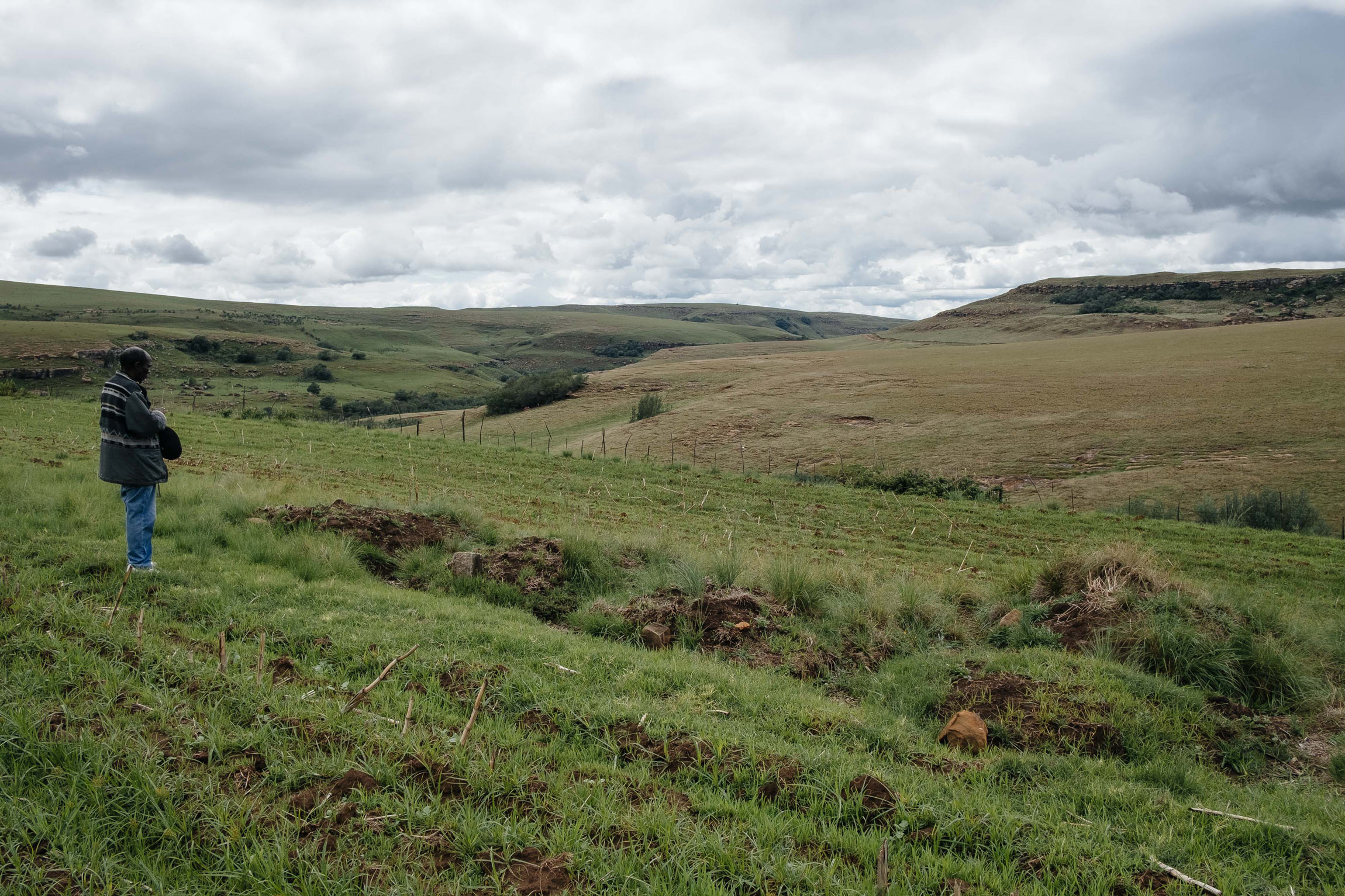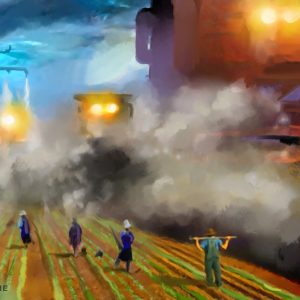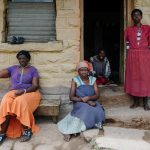Land reform leads to eviction after 80 years’ labour
An 88-year-old woman has been threatened with the culturally taboo removal of her family’s ancestral graves after being evicted from the farm she worked on for decades.
Author:
25 August 2020

Eight decades of hard labour on a white-owned commercial farm did not pay off for an elderly Eastern Cape woman, who was promptly evicted by the new black owner after the farm was sold to the government and redistributed under its land reform programme.
Born on Ola farm near Khowa during apartheid, NoLinette Nqoko, 88, and her relatives lived a hard life. Being near the South Drakensberg mountains, winter snowfall made the gravel road to town impassable. Her great-nephew, George Nqoko, 52, grew up on the farm and now runs the paralegal advice centre in Khowa, previously known as Elliot, about 15km away.
George recalls his childhood on the farm. “The owner … sometimes caught us on our way to school and would tell us, ‘No school today.’ And then we kids would be forced to spend the day pouring pesticide on the crops by hand using a one-litre Coke bottle.

“Mama NoLinette would make African beer for the adults, but as soon as they saw the farmer’s car coming, she would rush to dispose of it while the men would race back to the fields to work. My uncle thatched the roofs of two houses here, which were for whites only, while we black farm workers lived in these mud huts,” he said, pointing to the huts just a few hundred metres from the houses.
He remembers his uncle pleading with the white “baas” to be paid more for their thatching work. At the time, the farmer paid them whatever he felt like after the job was done. “We used to go literally cap in hand to the baas,” says George. His sister died from cancer, after a lifetime spent spraying pesticides on crops inside greenhouses without a mask or other protective gear.
Change in fortune, for the worse
In 2015, the farm’s owner – Hendrik Pretorius, according to George – sold Ola farm to the government for its land reform programme in the Khowa region. By this time, NoLinette and her family had built up their herd to 40 cattle, their vegetable garden was flourishing and about 15 family members were buried in a gravesite on the farm.
The government allocated the farm to Wetana Damane from Tsolo, a town 135km away. In this area, the state bought more than 40 farms, or 12% of the commercial farming land, between 1999 and 2005 and redistributed it to emerging black farmers. The land reform programme in Khowa is said to be a government success story. But the state does not appear to have followed up on what happened to the workers living on these farms after it redistributed them to their new owners.
“Damane arrived and he straight away told us to leave,” says NoLinette, weeping. “He didn’t even have a meeting with us. He just told me I am old, so I cannot work. I must look for a house in the location. He said if we stayed, we would probably make a land claim, so we had to get out.”
Related article:
NoLinette had to move her cattle. Friends who had bought the nearby Killcholoumkill farm through the government’s land reform programme could accommodate some of the livestock, but NoLinette had to hire land for the rest. “We couldn’t afford enough space for all of our cattle. Some cattle were stolen from Ola farm before I could move them. The children had to change schools.”
George said he had tried to reason with Damane. “I told him what he did to my family was wrong and he replied that he was not buying the people who lived on the farm, he was buying the land. He did not want to hear anything about the Prevention of Illegal Eviction [from an Unlawful Occupation of Land] Act. He also threatened that he would move our ancestral graves away.”
Fifteen Nqoko family members are buried in a field on Ola farm, but the family is not permitted to visit their graves. Some family members climb over two fences to pay their respects when Damane is away, but NoLinette is too old to do this. Damane will also not allow them to fence off the 10 x 1m area to prevent livestock from trampling the graves, which are surrounded by mielies and grazing cattle. The grass is overgrown as the family cannot tend the graves, which have rocks for headstones.
“We had 10 grannies dying here on this farm because the Nqoko family was here for generations. All these graves belong to us – my mom, grandmother, uncle and cousins. They don’t belong to him. This is amaBhokwane land, which is our clan name. Even the white farmer didn’t plant crops here near our gravesite,” says George. A major worry is that nobody else from the family can be buried there while the ownership of the land remains in dispute.

George approached the Department of Land Affairs and a field officer, Miranda Qhama, visited NoLinette three years ago to help her make a land claim. But the claim has never been processed.
“From time to time, uMiranda says she is getting me a proper RDP house. But it never happens,” said NoLinette.
Qhama referred New Frame to Eastern Cape Agriculture, Land Reform and Rural Development spokesperson Thabile Mehlomakhulu, who said only that there was no record of any land claim from NoLinette. She declined to comment further.
‘Land reform is a disaster’
Lungisile Ntsebeza, a professor, land reform expert and the AC Jordan Chair at the University of Cape Town, comes from nearby Cala. He has done research on land reform in the Khowa and Cala area for years.
“Land reform in South Africa is a disaster for a number of reasons,” he says. “First is the widely accepted story of less than 10% of agricultural land that has been transferred to black people. Second, where land has been transferred to black people, it is the elite that is favoured often, as is the case with Mrs Nqoko, at the expense of farm workers and dwellers.
Related article:
“As the sad story of Mrs Nqoko shows, the state does not protect farm workers and dwellers and instead makes them vulnerable to unscrupulous and wicked black farmers. Where is the redress and justice in such circumstances? This shows that blacks can be as vicious as their white counterparts, or worse, as we see in Mrs Nqoko’s case,” says Ntsebeza.
George and NoLinette say Damane does not spend a lot of time at Ola farm, but hires teenagers to work there. “He just takes those little boys [teenagers] from the Transkei, those suffering boys, and gives them mieliemeal in payment. If they do something wrong, he fires them. You will even find these kids work and work and sometimes get nothing, because if the Department of [Employment and] Labour inspectors come, they get sent packing,” says George.
Despite numerous attempts, New Frame could not trace Damane.
Township living conditions
NoLinette now lives in a half-built house with some of her relatives in one of Khowa’s townships. There is no space to grow vegetables or keep livestock. She sold some of her cattle to buy the plot and begin building the house. Her son was paying for the house to be completed when he died, leaving NoLinette without the funds she needs to finish building the walls and add a roof. Their homemade pit toilet is unsafe for an 88-year-old woman to use.
“I have only eight cows left now. I am selling them one by one to pay school fees, and soon I will have nothing left because I can’t build up my herd. I am so stressed, because I thought I would die there on my farm and be buried with my ancestors. I used to share that land with the previous owner,” says NoLinette.
During the coronavirus pandemic, NoLinette fell ill with what she says felt like cholera.

“I was very ill. But God still wants me to exist on this Earth. I want a bigger house so that my children could have a place to live in … Government is not helping me … I would like to ask for help from the government because I no longer have a son to help me … I would go back to the farm as I don’t like township life at all,” says NoLinette.
“How can our government expect an old lady to move to a township and then relieve herself in the bushes? Even our young family members can get raped here,” says George. “We are always worried and we don’t have the resources to finish building this house. Sometimes criminals kick the door in at night as this house is not secure.”
Meanwhile, like in thousands of similar cases, the government seems to be fobbing off NoLinette, perhaps in the hope that she will give up seeking justice for her illegal eviction from Ola farm. George has approached public interest law centres and Chapter 9 rights institutions in an attempt to get justice for her before she dies of old age.
NoLinette cries over her lost land and livestock every time they meet now, he says.

Correction, 11 August 2021: Khowa was previously misspelt.


